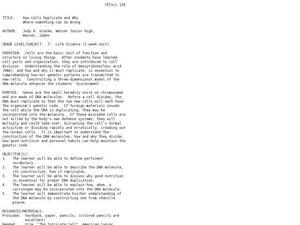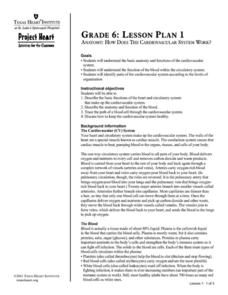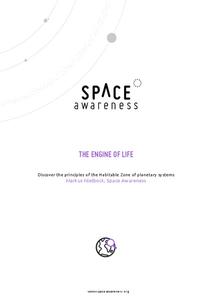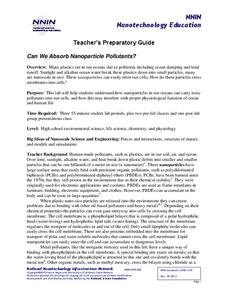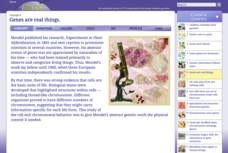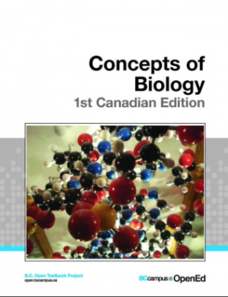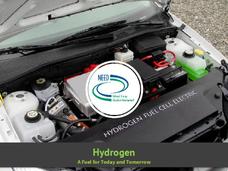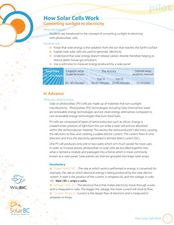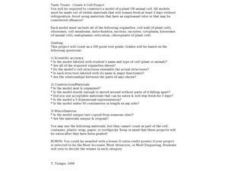Curated OER
How Cells Duplicate and Why, Where Something Can Go Wrong
Seventh graders study cell division. They examine the role of deoxyribonucleic acid (DNA), and how and why it must replicate, is essential to comprehending how our genetic patterns are transmitted to new cells.
Texas Heart Institute
Anatomy: How Does the Cardiovascular System Work?
How can the circulatory system compare to a city map? Pupils distinguish the "roadways" and "vehicles" of the cardiovascular system, compare the anatomy and function of veins and arteries, and review different types of blood cells with...
Space Awareness
The Engine of Life
There is a specific zone, or distance from a star, that a planet must be in order to have water in a liquid form. The activity demonstrates how flux density depends on its distance from the source. A photovoltaic cell gets power to...
Space Awareness
Climate Zones
The climate at the equator is hotter than the climate at the poles, but why? The lesson goes in depth, explaining how the angles of illumination relate to the heating rate at different latitudes and seasons. Scholars use a strong lamp,...
Howard Hughes Medical Institute
Spreadsheet Tutorial 2: Autofill Data, Cell References, and Standard Deviation
If you've always wanted to know more about spreadsheets, here's a perfect resource for you. A self-paced tutorial introduces how to autofill and copy formulas in a Google sheet or Excel spreadsheet. It also shows users how to find range,...
National Nanotechnology Infrastructure Network
Can We Absorb Nanoparticle Pollutants?
Just because we can't see it doesn't mean it isn't there! A growing concern for environmental scientists is toxic nanoparticles in our air and water. Young scholars conduct an experiment to demonstrate how these particles can cross our...
Cold Spring Harbor Laboratory
Genes Are Real Things
Proving microscopic structures exist is a difficult task. Learn how scientists did just that in the mid-1800s as they set out to identify the cellular structures related to genetics. The online lesson explains the collection of work that...
Scholastic
Study Jams! The Immune System
A set of slides depicts sick children, an artistic rendition of a white blood cell amongst red blood cells, and a diagram of part of the lymph system to teach youngsters about immunity. Kids will find that it is made up of skin, white...
Science Geek
Electrochemistry
Introduce redox reactions including how to identify and solve them. After reviewing the rules for assigning oxidation numbers, a presentation presents trends and vocabulary. Finally, it explains voltaic cells, electrolytic cells,...
Give and Let Live
Blood and Transplant: Bone Marrow
What causes someone to need a bone marrow transplant? Fascinate your class with a lesson on the intricate task of procuring bone marrow for patients suffering from illnesses like leukemia. The fourth and final installment in a series...
BC Open Textbooks
Concepts of Biology – 1st Canadian Edition
How diverse are living things? Individuals explore topics such as cells as the foundation for life, cell division and genetics, molecular biology, and animal reproduction using an open resource Biology textbook. They learn key terms...
Curated OER
Prokaryotes and Eukaryotes
Examine cyanobacteria cells as an example of prokaryotes and several other alga as examples of eukaryotes. Future biologists compare the two and notice the absence of nuclei in prokaryotes. These are classic activities for this purpose,...
Curated OER
Electric Current
Necessary vocabulary for exploring electric current is detailed in these slides. Circuits, voltage, wet and dry cell and batteries are defined, making this a great overview on the subject. It could also serve as a complement to a lesson,...
National Geographic
Battery Lesson Plan
Not really just a lesson plan, but a series of activities, reading handouts, and teacher's guidelines for conducting a class mini unit on the battery. Physical scientists focus on the history of the cell battery, experiment with...
National Energy Education Development Project
Introduction to Hydrogen
Every region has a renewable resource that can be used to make hydrogen. But, what is hydrogen and why can it be used as an energy source? Find out with a presentation that answers these questions and then discusses where hydrogen is...
Curated OER
Raven Chapter 37 Guided Notes: Plant Transport
Introduce botany or biology beginners to nutrient transport in plants by assigning this worksheet. Learners describe turgor pressure and its role in hydroregulation. They explain the functions of xylem, phloem, stomata, and guard cells....
Curated OER
Control of the Cell Cycle
In this cell cycle worksheet, students review how enzymes control the cell cycle and what happens when the cell cycle becomes uncontrolled. This worksheet has 7 short answer questions.
Curated OER
How Solar Cells Work: Converting Sunlight to Electricity
Students examine how to convert sunlight to electricity. In this renewable energy sources lesson plan students explain how solar cells are used and use a voltmeter to measure the energy produced by a solar panel.
Curated OER
Animal Cell Coloring
This is a worksheet where students can review the different parts of an animal cell by coloring in the various sections.
Curated OER
The Effects of Osmotic Balance and Imbalance In Living Cells
Learners investigate osmotic balance in living cells. In this osmotic balance lesson plan, students use elodea leaves to study the effects of salt solutions on the cell. They compare the changes in an elodea leaf with salt water on it to...
Curated OER
How to: Build a Plant Cell
Students build a 3-dimensional model of a plant cell with household objects. In this plant biology lesson, students construct replica plant cells in groups of three. After completing their projects, students share their creations with...
Curated OER
Digit Cells
In this algebra worksheet, students rewrite a word problem using algebraic symbols to find the digit in the first cell and tell how many zeros are in the entire digit number. There is an answer key.
Curated OER
Cell Transport & Reproduction
Students are able to define the following terms: Osmosis, Isotonic Solution, Hypotonic Solution, Hypertonic Solution and Passive Transport. They read and complete a Mitosis worksheet, and play a Cell COmputer Game.
Curated OER
Tasty Treats
In this biology worksheet, students construct a model of a plant or animal cell using edible materials that will remain fresh at least three days. They identify and label each part to include various organelles as listed. Students also...
Other popular searches
- Animal Cells
- Plant and Animal Cells
- Plant Cells
- Stem Cells
- Eukaryotic Cells
- Blood Cells
- Cells Crossword
- Cells and Organelles
- Cheek Cells
- Life Science on Cells
- Microscope Cheek Cells
- 3d Animal Cell
